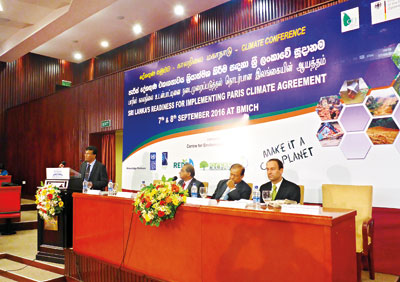News
Sri Lanka formally ratifies Paris climate agreement
View(s):By Malaka Rodrigo
Parliament unanimously approved ratification of the Paris Agreement on Climate Change two days ago. With this action, Sri Lanka formally joins the list of countries to follow the action plan to reduce greenhouse gas emissions mooted at the United Nations Climate Conference in Paris last December.

The two-day conference to discuss “Sri Lanka’s Readiness for Implementing Paris Climate Agreement” being held at the BMICH
The Minister of Science, Technology and Research, Susil Premajayantha, signed the Paris Agreement on April 22 but a treaty is not enforceable or valid until the country gets formal approval from its legislative body to show its consent to be bound to an international pact. Earlier this month, the United States and China – which together are responsible for 40 per cent of the world’s carbon emissions – also ratified the Paris Agreement.
As of September 7, 180 countries have signed the Paris Agreement, which proposes activities to keep an increase of the global average temperature to below 2C that of pre-industrial levels by reducing the emission of greenhouse gases such as carbon dioxide.
Minister Premajayantha says that country will attempt to follow a green-friendly development path. The “Sri Lanka NEXT – Blue Green era” is such economic development plan aimed at achieving sustainable development.
Meanwhile, the Centre for Environmental Justice (CEJ), together with a number of other organisations, held a two-day conference to discuss “Sri Lanka’s Readiness for Implementing Paris Climate Agreement” with aim of popularising Paris Outcome and agreed targets.
CEJ Executive Director Hemantha Withanage said there much to do in Sri Lanka, and systemic change was needed. “Many government agencies still lack capacity or thinking to be innovative on following a low carbon path. The actions are complicated both nationally and internationally, but it is the time to act,” he called.
Delivering the conference’s keynote speech, Prof. Buddhi Marambe reminded that signs of changing climate were already evident. “It is ironic that of the first 16 years of the 21st century, 15 are about the warmest years Earth has experienced – so climate is now like Usain Bolt who beats his own records,” Prof. Marambe said.
Prof. Marambe, who has been on the team of delegates to the UN’s Climate Conferences for three consecutive years, said that although Sri Lanka is a small country, the team spoke out about the country’s concerns especially the need to obtain support for climate adaptation.
Sri Lanka should be cautious about trying to setting up new coal power plants and should instead look at environmentally-friendly renewable energy, the Chairman of the Strategic Enterprise Management Agency, Asoka Abeygunawardana, said.
President Sirisena this week initiated a project to popularise a new community-based power generation project, Soorya Bala Sangramaya (Battle for Solar Energy) that will promote the setting up of small solar power plants on the rooftops of households. It is expected that this intervention could add 200 MW of solar electricity to the national grid by 2020 and 1000 MW by 2025.

